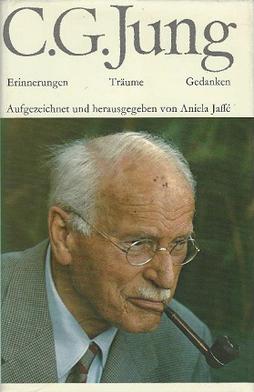 As I've mentioned before elsewhere, I used to put great stock in the analytical psychology of Carl Jung. And, truly, in terms of getting to know one's personal unconscious issues, a Jungian analyst is as good as one of any other modality.
As I've mentioned before elsewhere, I used to put great stock in the analytical psychology of Carl Jung. And, truly, in terms of getting to know one's personal unconscious issues, a Jungian analyst is as good as one of any other modality.Where I've quibbled with Jung, strictly as an unprofessional mind you, is with his so-called "collective unconscious." This is where, for Jung, the archetypes abide which form the basis of one's "complexes". Archetypes act as though they each had their own consciousness, if you will allow; their own willfulness. Dig deep enough with your analyst, and you will arrive in the presence of the archetype which (or who) forms the kernel of your complex.
Balderdash, right? Former president of the C. G. Jung Foundation, Jeffrey Burke Satinover, has done outstanding work deconstructed the "collective unconscious" of Jung and showing its direct relation to paganism.
But, in my opinion, Jung's system still does yeoman's work describing the inner life and outer manifestations of the human mind in human culture. Yes, it is pagan; so is René Girard's unregenerate cultural template, the "primitive sacred." And, unlike Freud, Jung recognizes the collective nature of the psyche in his analytical psychology, albeit in a metaphysical way quite alien to Girard's mimetic theory.
The thing is, both seem helpful to understanding the dilemmas of the modern crisis. Girard lays bare the mimetic nature of unredeemed human culture, stripping us of the illusion of the autonomous self; Jung describes the uncanny similarity and power of inner thoughts, images, and motivations among all peoples, religions, and ethnic groups undetectable to the scrutiny of the anthropologist but quite predictable and recognizable to the inner eye of the analyst.
For example: Jung's system would see Loki in Norse myth as a depiction of the "trickster" archetype. This archetype, one could observe, has as little concern for the welfare of humans as concern for Balder. This trickster archetype one might say has been working deviously, nefariously, for decades among human cultures - unrecognized, unheralded, ignored by a reductionist race of beings who cast out the baby of allowing for such powerful influences with the bath water of supernaturalism. Like an imp at the basis of such thinking and behaving as "free love" and Lesbian/Gay/Bisexual/Trans gnosticism, the trickster archetype degrades the humanith literally into a degenerate, self-loathing, self-extinction-seeking race of beings.
Like a naughty, little boy, the trickster archetype trashes and then runs away to find new mischief and havoc to raise. Or perhaps Mars strides among "street youths" in a Parisian slum, if you want to analyze another archetype whose monumental presence is ignored but present in today's hazardous world.
Jung, like Girard, still has much to contribute to human awareness and welfare. Even if one doesn't believe in archetypes, one should respect their powerful, illusory (?) influence as Jung described them. Or, as a wiseman once said, just because you don't believe in ghosts doesn't mean you shouldn't or won't be afraid of them walking in the dark.
2 comments:
Dear Ath,
Okay, I need HELP here. Big time HELP.
Even after throwing away thousands of dollars in (parent-child anger-management issues, to marriage, to self) therapy I never got that Jungian crap. Whoops, sorry, my tongue got the better of me here.
However, once I immersed myself into Girardian thought (coupled with Gil's hard-hitting critique of Jung, which used a lot of the work of deconstruction of Jung thought by Jeffrey Burke Satinover) I felt something true come over me that was at a much deeper place than any pseudo-psychological therapy on the unconscious could ever get to. Girardian thought also helped to put to rest my total dislike of religion and people who had a religious calling. For me mimetic theory helped to explained hierarchy and differences as well as understanding generative behavior and most important to me, violence.
I had done my share of study (particular emphasis on violence and peace initiatives including so many "fads" or ideologies that supposedly had at their source Jungian thought – archetypes and all. They all inevitably led back to a labyrinth of violence. When I would really challenge these thoughts I found that I could never see my way out of the violence and felt that a strong warning label needed to be applied to all these studies (which always had myth so much a part of their center).
So I admit that I need help in seeing the benefit of recommending further study into Jungian thought. I know of no one who has spare time on their hands, especially spare time to dabble into the myths (where Jungian psychology goes) with no reason, nor faith, for which to help find their way out of the violence.
So I admit that I haven't been a student of Jung, however I have been a victim of Jung's system and I must say I don't wish that on anyone.
Wow, ah, I maybe got carried away in that last comment. Sorry. I am always having to bite my tongue when it comes to this area of help. You know the ol' poke at attorneys -- how low they are on the list of most admired? Well I place psychologists just a notch above door-to-door salesman who are just a notch above attorneys.
I am serious though, I need help in understanding your post and what you see as the positive contribution Jung has made to human/culture welfare. It seems to me that one could look at Jung's work and see that it set us back some 100 years or so from embracing forgiveness and conversion of the Good News.
Post a Comment